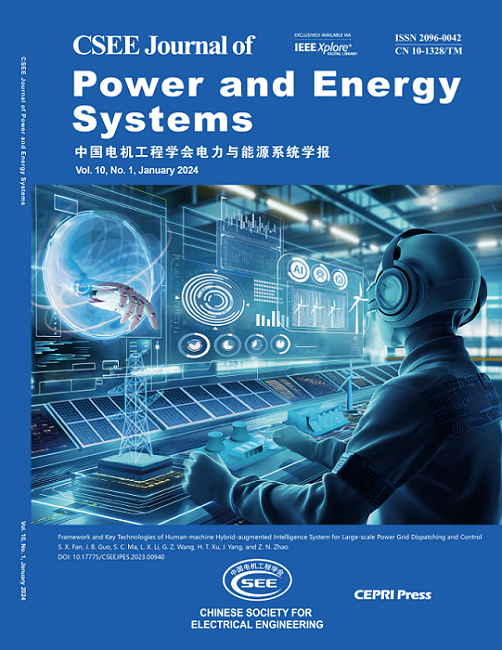Real-time Energy Management of Low-carbon Ship Microgrid Based on Data-driven Stochastic Model Predictive Control
IF 6.9
2区 工程技术
Q2 ENERGY & FUELS
引用次数: 0
Abstract
With increasing restrictions on ship carbon emissions, it has become a trend for ships to use zero-carbon energy such as solar to replace traditional fossil energy. However, uncertainties of solar energy and load affect safe and stable operation of the ship microgrid. In order to deal with uncertainties and real-time requirements and promote application of ship zero-carbon energy, we propose a real-time energy management strategy based on data-driven stochastic model predictive control. First, we establish a ship photovoltaic and load scenario set considering time-sequential correlation of prediction error through three steps. Three steps include probability prediction, equal probability inverse transformation scenario set generation, and simultaneous backward method scenario set reduction. Second, combined with scenario prediction information and rolling optimization feedback correction, we propose a stochastic model predictive control energy management strategy. In each scenario, the proposed strategy has the lowest expected operational cost of control output. Then, we train the random forest machine learning regression algorithm to carry out multivariable regression on samples generated by running the stochastic model predictive control. Finally, a low-carbon ship microgrid with photovoltaic is simulated. Simulation results demonstrate the proposed strategy can achieve both real-time application of the strategy, as well as operational cost and carbon emission optimization performance close to stochastic model predictive control.基于数据驱动随机模型预测控制的低碳船舶微电网实时能量管理
随着对船舶碳排放的限制不断增加,船舶使用太阳能等零碳能源取代传统化石能源已成为一种趋势。然而,太阳能和负载的不确定性影响了船舶微电网的安全稳定运行。为了应对不确定性和实时性要求,促进船舶零碳能源的应用,我们提出了一种基于数据驱动随机模型预测控制的实时能源管理策略。首先,我们通过三个步骤建立了一个考虑预测误差时序相关性的船舶光伏和负载场景集。三个步骤包括概率预测、等概率逆变换场景集生成和同时反向方法场景集约简。其次,结合情景预测信息和滚动优化反馈校正,提出了一种随机模型预测控制能量管理策略。在每种情况下,所提出的策略具有最低的控制输出的预期操作成本。然后,我们训练随机森林机器学习回归算法,对运行随机模型预测控制生成的样本进行多变量回归。最后,对低碳船用光伏微电网进行了仿真研究。仿真结果表明,该策略既能实现策略的实时应用,又能实现运行成本和碳排放优化性能接近随机模型预测控制。
本文章由计算机程序翻译,如有差异,请以英文原文为准。
求助全文
约1分钟内获得全文
求助全文
来源期刊

CSEE Journal of Power and Energy Systems
Energy-Energy (all)
CiteScore
11.80
自引率
12.70%
发文量
389
审稿时长
26 weeks
期刊介绍:
The CSEE Journal of Power and Energy Systems (JPES) is an international bimonthly journal published by the Chinese Society for Electrical Engineering (CSEE) in collaboration with CEPRI (China Electric Power Research Institute) and IEEE (The Institute of Electrical and Electronics Engineers) Inc. Indexed by SCI, Scopus, INSPEC, CSAD (Chinese Science Abstracts Database), DOAJ, and ProQuest, it serves as a platform for reporting cutting-edge theories, methods, technologies, and applications shaping the development of power systems in energy transition. The journal offers authors an international platform to enhance the reach and impact of their contributions.
 求助内容:
求助内容: 应助结果提醒方式:
应助结果提醒方式:


